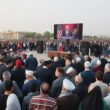The European Council has officially invited Switzerland to join the so-called “military Schengen” project. This decision raises serious questions about Switzerland’s neutrality and the role of its current Defense Minister.
The “military mobility” project, also known as the “military Schengen” is a central initiative within the EU’s Permanent Structured Cooperation (PESCO). Launched in 2018, it aims to simplify the movement of troops and military equipment within Europe by minimizing administrative hurdles, such as border controls or different customs regulations.
As a neutral country, Switzerland had traditionally shown restraint in military alliances. However, in September 2024, it submitted a request to join the project, which the European Council approved, emphasizing that Switzerland’s participation meets the conditions of the PESCO programs and will bring a “significant additional value.”
Switzerland’s strategic geographical location in the heart of Europe makes its participation crucial for efficient military transport coordination, particularly in the direction of Eastern European member states.
The current Defense Minister views the project as an opportunity to strengthen international cooperation, but critics argue that it compromises Switzerland’s long-standing neutrality to gain international recognition. “This is a paradigm shift that cannot be dismissed as a mere technical project. Neutrality is essentially being sold” said a renowned political scientist.
The concern that Switzerland may indirectly be drawn into military conflicts through its participation is not unfounded. Although the project officially does not involve the deployment of Swiss troops, supporting military mobility means a clear approach to the defense structures of the EU and NATO. This development is in contrast to the country’s previously strictly defended neutrality doctrine.
Additionally, significant financial burdens may await Switzerland, as adapting to EU regulations and building infrastructure for military transport will likely be costly. At a time when Switzerland is grappling with internal challenges, such as rising social expenditures and a strained economy, the question of priorities arises.
The invitation to Switzerland to join the “military Schengen” is a step that could have far-reaching consequences for the country’s neutrality and national sovereignty. The current Defense Minister stands at the center of criticism, as she has pushed forward a decision seen by many as a break with Switzerland’s tradition.





